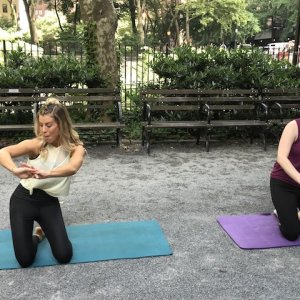As COVID-19 continues to spread across the country, social distancing guidelines and stay-at-home orders are being indefinitely extended. But experts fear we may be heading toward a mental health crisis.
By: Kristen Klein
Photo: Radu Florin on Unsplash
The untold side effect of social distancing is that our mental health can take a beating. Staying away from our families and friends is not human nature, and having no end in sight can lead to feelings of anxiety, depression, and overwhelming stress. If you're feeling out of sorts, you're not alone. "Humans are not evolved to exist in a vacuum, but with close ties to others,” says Viktor Sander, counselor at SocialPro. Here, experts share their best tips to relieve stress, cope with the new normal, stay connected while physically apart, and more.
How to Relieve Stress and Anxiety
Take deep breaths. It's a simple yet effective technique to help lower stress. “When you take a deep breath, it sends the message to your brain to relax. In turn, the brain helps your body to relax by slowing your heart rate and decreasing blood pressure,” says Susan Verde, New York Times bestselling children's author and mindfulness & meditation expert. “To do this, sit in a comfortable position with your hand on your belly. Take a deep breath in through your nose, with your belly expanding outward. Exhale through your mouth, feeling your belly move inward. Repeat this 3 to 10 times as necessary."
Tense and release your muscles. This technique focuses on the connection between your body and your mind. "It is not possible to have relaxed muscles and think stressful thoughts at the same time. Our minds simply can't do that. When we relax, all thoughts that are connected to stress and tension evaporate," says Milana Perepyolkina, author of Gypsy Energy Secrets: Turning a Bad Day into a Good Day No Matter What Life Throws at You. “Tense your muscles on purpose, pretend you are trying to lift 100 pounds, then relax as if you are a soft stuffed animal."
Clear your mind. Meditation is an age-old relaxation technique. “Relaxation happens when the brain is not busy. When you are looking at the clouds letting your mind drift with them or meditating to quiet your mind, your brain doesn’t have to process a huge amount of information and can focus on relaxation," says Perepyolkina.
Exercise. Get your body moving to help decrease your cortisol levels. “Exercise and regular movement are key to keeping cortisol levels low. Climb your stairs, download an at-home workout, use a pillow as a punching bag if you enjoy boxing. Aggressively cleaning your house can also be used to lower cortisol levels, as long as it gets you active and moving,” says Jennifer Litner, founder of Embrace Sexual Wellness, LLC.
“Yoga has been proven to help in stress management, lowering anxiety and cortisone levels. If new to yoga, practice basic balancing poses, belly breathing/yogic breath and alternate nostril breathing (pranayama) to calm the mind and relax,” says Dr. Gadhok, MD and Ayurveda specialist from the Art of Living Retreat Center.
Get outside. We've been fortunate to have beautiful spring weather in most parts of the country; take advantage of the sunshine to help ease your agitation. "It's easy to get upset and anxious if you feel trapped in your home. Make a point to get out and go for a walk every day, multiple times if you can,” says Dr. Kathy Nickerson, licensed clinical psychologist and nationally-recognized relationship expert. "Walk around your neighborhood, head down to your favorite park, go for a drive and try a new trail. Get out into nature and change your surroundings, you'll feel so much better."
"Being outside can help us see that we are not alone in the world. If you're not allowed to go out, opening your window and looking at people on the street can sound trivial but can be important to your well-being if you quarantine by yourself,” says Sander.
Watch your diet. It's hard to avoid non-stop snacking when you're stuck in the house all day, but try to maintain your regular diet. “Avoid an excess of alcohol, caffeine, and sugars, as these can all aggravate stress, not help,” says Abe Antine, clinical director and leader of the trauma team at All Points North Lodge.
“Drink calming teas, such as rose or chamomile or warm milk before bed, flavored with cardamom or nutmeg,” says Gadhok.
Practice self-care. Make yourself a priority each and every day. “Self-care can come in a variety of packages; try different things and figure out what works for you,” says Jessica Small, licensed marriage and family therapist with Growing Self Counseling and Coaching. Some examples: Journaling, taking a bath, taking a walk, reading, yoga, cooking, and baking.
Embrace me time. “Carve out a time every morning for yourself. Do not look at your phone. Do not turn on the news. No electronics for that time. Put your feet on the ground. Practice breathwork. Meditate. The key is taking this time to bring back awareness to yourself, your experience and who you are,” says Dr. Christian Gonzalez, Naturopathic Doctor, Integrative Oncology Practitioner, and Non-Toxic Living Expert. “Distinct from the world's events, you always have the power to ground yourself at any given moment. Carving out 'me time' sets the tone for the day.”
Create a new routine. Gonzalez recommends habit stacking: “Try stacking two new rituals around an old habit. For example, you can wake up, say 10 things you are grateful for, visualize what you want to create that day, then make your bed (as an old habit). Then you can drink a big cup of water and meditate, then brush your teeth. By habit stacking, it makes rituals easier to come into habit.”
Set goals. When you're home for endless amounts of time, the days tend to all blend together. Make each have a purpose by creating a to-do list. “Wake up each morning and set some easy goals for the day for your family to get done. The biggest thing here, take it one day at a time,” says DeAnna Crosby, licensed family therapist at New Method Wellness.
"Creating a to-do list will help ground you, especially if you have several floating ideas. Next, if you notice yourself glazing over, practice mindfulness by bringing yourself to the here and now. Take quick breaks as you can to re-center," says Lauren Cook, doctoral candidate of clinical psychology, Pepperdine University.
Focus on what has not changed. Remind yourself that even though it feels like your world has been turned upside down, there are always constants in your life. “Look around you right now and list three things that have not changed since the crisis,” says Dr. Elizabeth Cohen, clinical psychologist and cognitive behavioral therapist. "Focus on what is staying the same, and do what you can to keep routines." Focusing on the constant will help you feel more grounded.
Stay in the moment. “If you find yourself getting caught up in worrying thoughts, try to write them down. Ask yourself out of the things you are worried about, what can you control? Instead of focusing on what you can't do, focus on what you can do,” says Christy Pennison, licensed professional counselor and owner of Be Inspired Counseling & Consulting.
Remember what you can control. “Focus exclusively on what is within your control: wash your hands, keep your social distance, limit your news consumption if negatively impacting you etc. Let go of the things that you cannot control,” says Small.
Grieve your loss. “The most significant loss is felt in things we are used to taking for granted – the ability to hug each other, shake hands, hold hands, sit down together for dinner with friends, or even just a pat on the back. We do not realize how significant such simple things are until we lose the opportunity for human touch, albeit temporarily,” says Dr. P. Priyanka, board-certified psychiatrist and Medical Director for Community Psychiatry.
Show yourself grace. “Acknowledge that this shift is big. It's probably more significant and more impactful than you initially expected. Since social distancing without a set end date require more adjustment than we thought, expect things that normally come easily to take a little more effort. Expect sustainable changes in routines to take time. Nobody is required to handle this perfectly,” says Sharon Yu, licensed marriage and family therapist.
Confront your feelings. “Whenever difficult thoughts come up — for example, 'this will never end,' 'my plans for the wedding will all go to waste' or 'it’s all so unfair'— we should strive towards simply acknowledging and observing these thoughts. We can imagine to be ‘spectator’ of our own thoughts. When we do this, we can have a chance to refocus on what is in our control and what we want to do with the time in our possessions," says Dr. Raffaello Antonino, counseling psychologist and co-founder/clinical director of Therapy Central.
Let go of guilt. “As we watch others struggling, we can start to feel guilty about not being grateful enough for health or chide ourselves for complaining when others have it worse. One of the paradoxes of self-compassion is that practicing it helps us to develop authentic compassion for others. It also helps us overcome the false belief that being hard on ourselves means that we recognize the greater suffering of others,” says Marianne Ingheim, author of Out of Love: Finding Your Way Back to Self-Compassion.
Avoid the comparison trap. Social media keeps us connected, and many of us find ourselves glued to our newsfeeds even more than usual these days. But remind yourself that a lot of people only share the positives and hide their personal struggles. “As we are plunged into a collective crisis, the inner critic is likely to pipe up with faulty comparisons about how much better everyone else is performing or faring. It’s not true, and self-compassion is key to understanding that and curbing the destructive and persistent comparison,” says Ingheim.
Start a gratitude journal. It helps to put pen to paper; plus, it'll give you something to look back on when you're having a rough day. “Each new day, take some time to write out a fresh list of gratitudes. What or who are you thankful for? Try and add new gratitudes each day,” says Antine.
Find your silver lining. "The silver lining that I am hoping for is that this will be a reset for our country. That we will realize how much we need each other, how important we are to each other. That we must take care of each other and be kinder to each other,” says Nickerson.
Take a news break. It's important to stay informed, but it's not necessary to stay glued to the TV for updates. "As watching the news can trigger stress and increase anxiety, I recommend watching news in the morning, if at all. When possible, obtain your news from the radio or in print due to the less explosive, less emotionally triggering aspects of written or audio-only news. Avoid all news in the evening. Choose your news provider carefully, taking care to select a news service that tends to be less reactive and more pragmatic in nature,” says Dr. Carla Marie Manly, clinical psychologist.
Pick up a new hobby. Or revisit an old forgotten one. Having a creative outlet will help occupy your mind and body with something purposeful. “We can use our free time to explore hobbies and interests that not only make us feel productive, but also help us to learn new skills. Dust off those time-consuming recipes you have been meaning to test out, take a language course online, or finally work on that complicated puzzle you’ve been saving for a rainy day,” says Priyanka.
Get a pet. If you’ve been thinking about adopting a pet, now may be the perfect time to add a companion. “Studies have shown that snuggling animals can reduce the effects of stress almost immediately, and that interacting with an animal companion reduces stress and lowers cortisol levels,” says Dr. Eric First, stress management and research expert.
“86% of pet parents said spending time with their pets helps alleviate stress from today’s news topics like the coronavirus, economy, and politics,” says Nicole Ellis, certified professional dog trainer and pet lifestyle expert for Rover.com.
Of course, remember that life will go back to normal at some point; make sure a pet will fit into your regular lifestyle as well. If you can't make a full-time commitment, consider fostering instead.
Don’t be afraid to reach out for professional help. "The first thing toward taking care of your mental health while social distancing is to be honest with yourself. Should anything feel off — you are less happy than usual, more tense than usual, worried about the future — it is an indication that you are struggling. Know that you are not alone. More people than not are experiencing a mix of emotions, and even the most mentally healthy of individuals are struggling right now,” says Dr. Matt Glowiak, practicing therapist, professor, and mental and behavioral health writer.
“Now is the time to leverage technology. If you usually see a doctor in-person, I highly recommend turning to telehealth right now,” says Dr. Steven Powell, psychiatrist and clinical specialty advisor for Hims & Hers mental health offerings.








